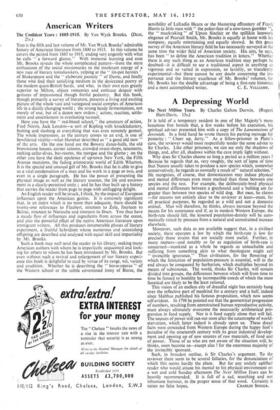American Writers Tins is the fifth and last volume of
Mr. Van Wyck Brooks' admirable history of American literature from 1800 to 1915. In this volume he covers the period from 1885 to 1915, ending very cogently with what he calls " a forward glance." With immense learning and ease Mr. Brooks reveals the whole complicated pattern—from the stern enthusiasm of the social missionaries to the intolerant energy of a new race of literary tomahawkers, yelping at the" tin-pot heroics' of Shakespeare and the " elaborate jocosity " of Dante, and finally those who find their satisfying medium in the desiccated poetry of the modern quasi-British bards, and who, in their own eyes greatly superior to Milton, abjure romantics and embrace despair with gestures of impassioned though fretful pedantry. But this book, though primarily a survey of literature, presents a living and exciting picture of the whole vast and variegated social complex of American life in a dizzily changing world ; the strong heady fermentations, not merely of one, but of a dozen new orders ; action, reaction, settle- ment and unsettlement in everlasting turmoil.
Here you have the " red-blood school," the amateurs of action, Fred Norris, Jack London—a sort of Kipling with knuckledusters, butting and slashing at everything that was even remotely genteel. The whole impression, as the century comes to an end, is one of bewildered vitality—what Huneker described as" a good old stew" of the arts. On the one hand are the Bowery dance-halls, the old brownstone houses, corner saloons, crowded sweat-shops, tenements, reeking cellar-dives, bar-rooms, the morgue and the ghetto ; on the other you have the sleek opulence of up-town New York, the Fifth Avenue mansions, the fading aristocratic world of Edith Wharton. It is the special and unusual gift of Mr. Brooks that he is able to give us a vital condensation of a man and his work in a page or two, and even in a single paragraph. He has the power of presenting the physical image .ts well as the literary essence, the life and environ- ment in a clearly-perceived unity ; and he has thus built up a history that carries the reader from page to page with unflagging delight.
An English reader will be struck, I think, by the impact of European influences upon the American genius. It is extremely significant that, in an index which is no more than adequate, there should be twenty-one references to Flaubert, nineteen to Zola, fourteen to Balzac, nineteen to Nietzsche and nineteen to Ibsen. You thus have a steady flow of influences and ingredients from across the ocean, and also the powerful effect of the native American literature upon immigrant writers. All this produces innumerable phases of literary experiment, a fruitful hybridism whose numerous and astonishing offspring are described and analysed with equal skill and impartiality by Mr. Brooks.
Such a book may well send the reader to his library, seeking many American authors with whom he is imperfectly acquainted and look- ing for others to whom he has been introduced by Mr. Brooks. But even without such a revival and enlargement of our literary experi- ence this book is delightful to read by virtue of its range, wit, variety and erudition. Whether he is describing the " horse-operas " of the Western school or the subtle envenomed irony of Bierce, the sensibility of Lafcadio Hearn or the blustering effrontery of Frank Harris (a little man with" the poker-face of a cow-town gambler "), the " muckraking " of Upton Sinclair or the spillikin lacework elegance of Pearsall Smith, Mr. Brooks is equally at home with his company, equally entertaining and equally shrewd. In this great survey of the American literary field he has necessarily surveyed at the same time the wider field of American society. His aim, he says, has been " to define the American tradition in letters." Whether there is any such thing as an American tradition may perhaps be doubted—it is difficult to see a traditional aspect in anything so vigorous and so varied in expression, so lavishly, so truculently experimental—but there cannot be any doubt concerning the im- portance and the literary excellence of Mr. Brooks' volumes, for Mr. Brooks has the double advantage of being a first-rate historian


































 Previous page
Previous page